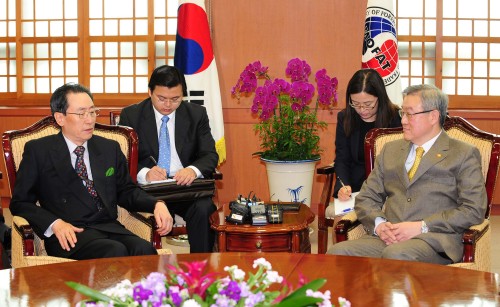Experts say China moving from stance that inter-Korean talks should precede multilateral discussion
Negotiations among regional powers over denuclearizing North Korea are likely to reopen at an early date, analysts and officials in Seoul said Wednesday, as a flurry of diplomatic events have been taking place on the divided peninsula this week.
As part of regional efforts to bring the reclusive Pyongyang back to the stalled negotiating table, China’s chief nuclear envoy is currently in Seoul for talks with South Korean officials. At the same time, a group of former statespersons are visiting Pyongyang for likely talks with North Korean leader Kim Jong-il.
Negotiations among regional powers over denuclearizing North Korea are likely to reopen at an early date, analysts and officials in Seoul said Wednesday, as a flurry of diplomatic events have been taking place on the divided peninsula this week.
As part of regional efforts to bring the reclusive Pyongyang back to the stalled negotiating table, China’s chief nuclear envoy is currently in Seoul for talks with South Korean officials. At the same time, a group of former statespersons are visiting Pyongyang for likely talks with North Korean leader Kim Jong-il.

International efforts to achieve North Korea’s denuclearization have been stalled for months as tensions between the two Koreas spiked following last March’s torpedoing of a South Korean warship and the November bombarding of a South Korean border island.
With China, host of the multinational dialogue, playing as the mediator, regional powers have been nearing agreement that nuclear envoys of the two Koreas should meet as the first step in resuming negotiations among all six dialogue partners: the two Koreas the U.S., China, Japan and Russia.
China hopes inter-Korean nuclear talks will lead to Pyongyang-Washington dialogue and ultimately the six-party talks, which have been suspended since 2008 December.
“Partners are definitely moving toward the (resumption of) six-party talks,” Paik Hak-soon, a North Korean expert at the Sejong Institute think tank in Seoul, said over the telephone. “They cannot go on ignoring the nuclear issue forever, especially not the U.S.”
Yang Moo-jin, a professor at South Korea’s University of North Korean Studies, agreed that revival of the talks is eminent “although South Korea and China may have different ideas about the agenda of dialogue.”
“While China sees inter-Korean talks as a tool to resume the six-party talks, South Korea would want to bring in a wide range of pending issues ― such as North Korea’s last year attacks ― into the talks,” he said.
Government officials here have also been noting the positive changes among regional powers, once largely divided over when and how to resume the peace talks with the unpredictable, nuclear-armed state.
During their meeting, Beijing’s chief nuclear negotiator Wu Dawei and his South Korean counterpart Wi Sung-lac “confirmed their governments’ united position” that an inter-Korean nuclear disarmament dialogue should be held to pave the way for larger-scale denuclearization talks, according to officials at Seoul’s Foreign Ministry.
“The two sides also agreed that (the inter-Korean) talks should not be held as a formal act and make actual progress to move toward the six-party talks,” a ministry official said on the condition of customary anonymity.
The Chinese envoy also reaffirmed such position during his meeting Seoul’s Foreign Minister Kim Sung-hwan Wednesday.
Although Pyongyang has yet to unveil its position in holding nuclear talks with Seoul, it will “have no other way” but to agree and will also express regret about the attacks “in someway or another,” analysts said.
While hoping to reopen dialogue with Seoul and the other five partners, Pyongyang has so far denied involvement in the two deadly attacks.
The North has also refused in the past to add nuclear issues to the agenda of inter-Korean dialogue, claiming it does not have to discuss denuclearization with Seoul as its nuclear weapons are aimed at the U.S., not South Korea.
“From what I see, North Korea has already agreed with China as well as the U.S. to hold nuclear talks with the South,” said Paik. “But it naturally does not feel the need to immediately respond to South Korea’s request.”
Yang agreed.
“Kim Jong-il will express his willingness to unconditionally rejoin the six-party talks and open inter-Korean dialogue,” he said, adding such a message will likely be delivered by the group of former leaders who are currently in Pyongyang.
A delegation of former statespersons led by former U.S. President Jimmy Carter arrived in North Korea Tuesday and is largely expected to meet with the North Korean leader.
The four members of the Elders, also including former Finnish President Martti Ahtisaari, former Norwegian Prime Minister Gro Brundtland and former Irish President Mary Robinson, will come to Seoul after their visit to the North to brief officials here on the results. The Elders is a private organization of retired state leaders founded by former South African President Nelson Mandela.
Despite the foreign minister’s previous remarks downplaying the delegation’s influence over pending issues on the peninsula, experts agreed that the former leaders will likely meet with the North Korean dictator and bring back a meaningful outcome.
“The delegation is formed with not just former heads of state, but global leaders. They will deliver Washington’s position to the North and the North is highly likely to unveil its position in detail over the stalled talks and its food conditions,” Yang said.
Carter, a Democrat from the state of Georgia who was president from 1977 to 1981, is well regarded in North Korea and last visited the communist state in August 2002 to secure the release of a jailed U.S. citizen.
The delegates have expressed their wishes to meet with Minister Kim as well as Unification Minister Hyun In-taek and possibly President Lee Myung-bak when they arrive in Seoul later this week as the last destination in their six-day trip, according to the Foreign Ministry here.
By Shin Hae-in (hayney@heraldcorp.com)







![[KH Explains] How should Korea adjust its trade defenses against Chinese EVs?](http://res.heraldm.com/phpwas/restmb_idxmake.php?idx=644&simg=/content/image/2024/04/15/20240415050562_0.jpg&u=20240415144419)










![[Today’s K-pop] Stray Kids to return soon: report](http://res.heraldm.com/phpwas/restmb_idxmake.php?idx=642&simg=/content/image/2024/04/16/20240416050713_0.jpg&u=)